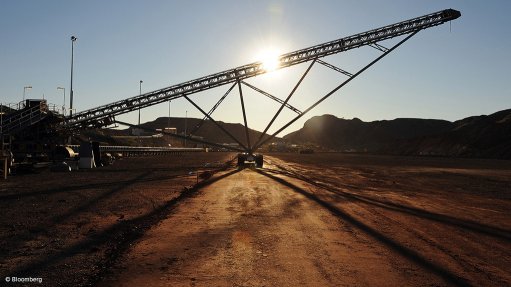
Photo by: Bloomberg
KALGOORLIE (miningweekly.com) – Atlas Iron MD Ken Brinsden on Monday expressed his confidence that the ASX-listed company could maintain its position in the iron-ore market, despite its current higher-cost truck haulage transport solutions.
Commenting on speculation that a push by the world’s largest iron-ore producers, including Brazil’s Vale, BHP Billiton, Rio Tinto and Australian producer Fortescue Metals, to increase lower-cost production could annihilate the demand for higher-cost product from smaller producers, Brinsden said that this was unlikely to happen.
“The entire pool of tonnes servicing the Asian markets is currently at 1.6-billion tonnes, and the big four only supply around 800-million tonnes of that. The other 800-million tonnes is structurally disconnected in its cost base,” Brinsden said on the sidelines of the Diggers & Dealers conference, in Kalgoorlie.
“You would have to see the big four expand their production phenomenally to materially displace this 800-million tonnes.”
Brinsden noted that this massive expansion was unlikely to happen, as the majors were under pressure from shareholders to limit capital expenditure, adding that expansions in iron-ore production would likely be incremental, with optimisation of current operations leading this.
Meanwhile, Brinsden pointed out that Atlas’ reliance on its truck-haulage transport method was still valid in the current market economics. In the medium to longer term, the company was hoping to solve its transport issue by implementing a rail transport solution for its Pilbara operations.
“We have a significant resource base, we are confident in our ability to solve infrastructure, in which case we will, over time, shift our cost base downwards,” Brinsden said.
Atlas recently revealed that the company would undertake cost-cutting initiatives to save between A$50-million and A$80-million a year, with all-in cash costs also expected to fall to between A$47/t and A$50/t in 2015, as the company benefitted from increased production after a period of substantial investment in project development.